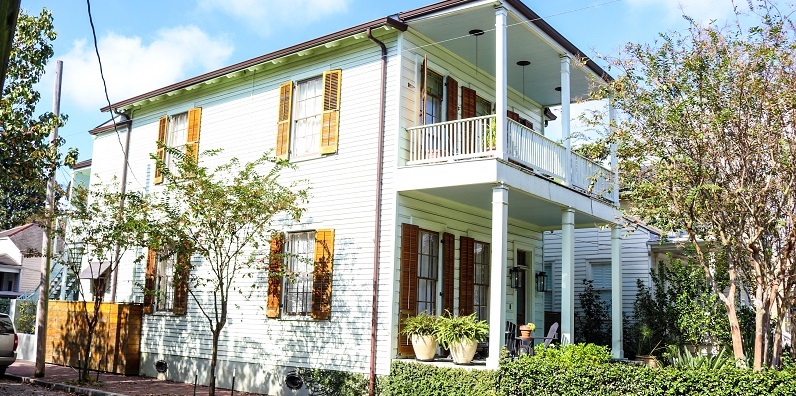
When deciding to purchase a NOLA vacation home, consider the amount of time you spend in the city every year, whether you will rent out your property as an STR, and if you’ll be beholden to HOA rulings.
For those who love New Orleans during Carnival season or visiting during the northern cold season.
As you come to New Orleans for work for the umpteenth time or time your annual visit to see your favorite parade during Mardi Gras, you may wonder how much easier (and cheaper) it’d be if you had a vacation home here. Money is a huge consideration, of course, but the quality of the experience also matters, and in New Orleans, it’s guaranteed to be unique. It can also get expensive if you keep staying in local hotels or the STRs.
People buy second homes for various reasons. For instance, baby boomers may sell their family home and move to a warmer climate, to retire somewhere they’ve always loved to visit or to be close to their kids. Others may find themselves in New Orleans for work or pleasure and would choose to buy a vacation home they could also rent out. Either way, the investment must make financial and logistical sense. And although investing in a historic property in New Orleans could mean high returns, it also comes with its own set of considerations.
Vacation Home Considerations
These factors apply to all vacation homes, whether you’re going to use it solely for yourself or rent it out when you’re not using it:
Affordability. Just like everywhere else, the New Orleans real estate market can be fickle and depends on many factors. Experts warn that you shouldn’t expect to break even or sell your New Orleans home for profit in the first few years after you buy. Calculating your return on investment to ensure it’s a sound one is also a good idea, as is budgeting for all the overhead costs.
Costs. Those pile up and could include property taxes, flood and other types of insurance, utilities, condo or homeowner’s association fees, parking, furnishings, repairs, maintenance, etc. If you’re renting out, it also means property management fees to a third party. Experts recommend setting aside 1 to 2 percent of the house’s value annually for maintenance and upkeep.
Your visiting schedule. Think about how often you’ll be able to visit to justify your purchase, especially if you don’t plan on renting out your vacation home.
Protecting your investment. Have someone watch it for you when you’re away. This could be your HOA, a property manager, or friends and family. They could check on any water leaks, pick up mail, mow the lawn, etc. This will keep the potential thieves away and will allow you to keep up with the repairs and bills. Having an emergency plan in case of flooding due to a natural disaster (or failing pumps, or broken pipes because of a freeze) is advisable. Louisiana is prone to hurricanes, floods, and, lately, drastic jumps in temperature, which wreaks havoc on the city’s infrastructure and can have devastating consequences for your investment if you’re not here (or outsourcing it to someone) to address it quickly.
Location. New Orleans is a tapestry of unique neighborhoods, each with its pros and cons. Do you want to be within walking distance to a parade route? Festival grounds? Near the lake? In the thick of things? Some areas, like the French Quarter or the Garden District, offer the convenience of having dining and shopping destinations within arm’s reach, but there’s heavy visitor traffic day and night, and the city gets especially loud and crowded during major festivals and Mardi Gras. Another consideration is the crime rate in the area, so check it out before you buy.
Renting Out
To make the purchase worth it, and to generate enough income to cover your mortgage payment, you’ll have to figure out how often you’ll need to rent out your home when you’re not using it to cover the expenses.
Another consideration is buying in an area where short-term rentals are allowed (this largely leaves the French Quarter out). You’ll also need to think about everything from how to furnish your home so that it’s suitable to potential renters to how to handle advertising, maintenance, repairs, cleaning between tenants, and tenant communication. Although the city of New Orleans recently cracked down on short-term rentals, it’s still allowed in most neighborhoods. Signing up with a local third-party agency to manage your rentals while you’re away could remove the hassle.
In addition to complying with the local STR zoning restrictions, if you’re buying a condo, for example, depending on the condo association, there may also be rules and restrictions regarding rentals, so it makes sense to find out what they are beforehand. The same thing applies to homeowner associations, which may set their own restrictions on renting out your home.
If you decide to rent out your property for more than a couple of weeks per year, you may end up paying a higher mortgage rate because it will be considered an investment property (on top of being your vacation home). Additionally, you’ll need to pay taxes on the rental income. Knowing what you’ll be paying beforehand could be helpful.
To help you choose the right place to invest in AND call your home away from home, consider enlisting the help of an experienced New Orleans Realtor.